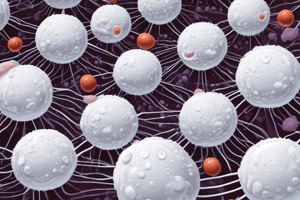Podcast
Questions and Answers
Which type of blood cells are motile and leave the bloodstream to migrate to the tissues?
Which type of blood cells are motile and leave the bloodstream to migrate to the tissues?
- Leukocytes (correct)
- Plasma cells
- Erythrocytes
- Platelets
What is the characteristic feature of most granulocytes in the connective tissue?
What is the characteristic feature of most granulocytes in the connective tissue?
- Phagocytosis
- Chemotaxis
- Apoptosis (correct)
- Mitosis
What is the normal range of white blood cells (leukocytes) in the blood?
What is the normal range of white blood cells (leukocytes) in the blood?
- 1000 - 5000/mm³
- 8000 - 11000/mm³ (correct)
- 11000 - 15000/mm³
- 5000 - 8000/mm³
Which type of blood cells have lobulated nuclei, few mitochondria, and few Golgi?
Which type of blood cells have lobulated nuclei, few mitochondria, and few Golgi?
What is the term for an increase in the total number of white blood cells (leukocytes) above 11000/mm³?
What is the term for an increase in the total number of white blood cells (leukocytes) above 11000/mm³?
Flashcards are hidden until you start studying
Study Notes
White Blood Cells
- Motile leukocytes that leave the bloodstream to migrate to tissues are neutrophils and eosinophils.
- The characteristic feature of most granulocytes in connective tissue is their ability to migrate towards the site of inflammation.
- The normal range of white blood cells (leukocytes) in the blood is 4500-11000/mm³.
Granulocytes
- Granulocytes have lobulated nuclei, few mitochondria, and few Golgi apparatus.
Leukocytosis
- Leukocytosis refers to an increase in the total number of white blood cells (leukocytes) above 11000/mm³.
Studying That Suits You
Use AI to generate personalized quizzes and flashcards to suit your learning preferences.




